After earning his fame as a member of the Montreal Canadiens beginning in 1952-53, where he won six Stanley Cup championships, six Vezina Trophies and the Hart Trophy, as well as the notoriety of being the innovator of the modern goalie mask in 1959, Jacques Plante, who was born on this date in 1929, began the second phase of his career when a personality conflict between the quirky goaltender and headstrong coach Toe Blake led to Plante being traded to the New York Rangers in 1963.
Plante's first season with the Rangers saw him play in 65 of the Rangers 70 games, but the club finished fifth out the six teams and out of the playoffs, a position he was not accustomed to while with the Canadiens, who not only made the playoffs ever year of his time in Montreal, they won the championship six out of his 11 seasons in Montreal.
His second season in New York was not nearly as simple, as he only played 33 games with the Rangers and spent time in the minors with the Baltimore Clippers, playing in 17 games before retiring, as he required surgery on his right knee in addition to his wife's illness at the time.
For the next two seasons Plante was a sales representative for Molson beer and had seemingly left his playing days behind him. All that changed in 1967 when the NHL expanded by six teams, doubling the number of jobs available at all positions, especially the close-knit world of goaltending, which previously was limited to roughly 12 jobs.
With the six new expansion teams looking to fill their rosters, a mix of career minor leaguers and veterans were pressed into service by "the second six", with mixed results. The St. Louis Blues were the most successful of the first year teams, upsetting the first place Philadelphia Flyers in the opening round of the playoffs and eliminating the Minnesota North Stars to become the Western Conference, made up entirely of the expansion clubs, representative in the Stanley Cup Finals, where they were quickly dispatched by the Canadiens.
Pleased with the play of veteran Glenn Hall, the Blues drafted the retired Plante in an effort to strengthen their goaltending tandem, and the rejuvenated Plante accepted the Blues overtures and returned to the NHL. Splitting time with Hall, they posted nearly identical records as the pair led the league with the least number of goals allowed, which earned them a split of that season's Vezina Trophy at the age of 40. The Vezina was Plante's seventh, a new NHL record.
During the playoffs, the Blues defeated both the Flyers and Los Angeles Kings to return to the finals, only to meet the same fate at the hands of the Canadiens.
St. Louis then traded Plante to the Toronto Maple Leafs for the 1970-71 season where he led the NHL with the best goals against average at just 1.88.
He played for the Maple Leafs again in 1971-72, appearing in 34 games, and most of the 1972-73 season before being dealt late in the year to the Boston Bruins where he played the final eight games of his storied NHL career, going 7-1-0 to help the Bruins qualify for the playoffs.
Having failed miserably with their choice of Maurice Richard as head coach, who lasted just two games of their debut season, the Quebec Nordiques of the rival World Hockey Association (WHA) signed Plante to a ten year contract to be not only their head coach, but their general manager as well. Plante did manage to improve the team enough in 1973-74 to post a winning record at 38-36-4, but did not qualify for the playoffs and resigned at the end of the season.
Plante then came out of retirement once more at the age of 46 to join the Edmonton Oilers, also of the WHA. The Oilers goaltending position that season was a revolving door of sorts, as Plante appeared in 40 games that season, but his 1592 minutes played was only the equivalent of 26 1/2 games. In all, the three Oilers goalies made 100 appearances in 78 games as their coaches, first Brian Shaw and later Bill Hunter were quick with the hook.
Sadly, Plante was attending the Oilers training camp for the 1975-76 season, but retired for good when he learned that his youngest son had passed away.
Aside from his credit for the modern goalie mask, he is also viewed as an innovator for shouting instructions to his teammates, leaving the crease to play the puck, raising his arm to indicate an icing call for his defensemen, cutting down angles and staying square to the shooter. He is also one of the goaltender to write a book on how to play the position and is viewed as the innovator of modern goaltending.
In addition to his Stanley Cups and awards, his final NHL totals were 837 games, 434 wins, 82 shutouts and a lifetime goals against average of 2.38.
Plante was inducted into the Hockey Hall of Fame in 1978 and the Canadiens retired his #1 in 1995.
Today's featured jersey is a 1956-57 Montreal Canadiens Jacques Plante jersey from the season Plante won his second of five consecutive Vezina Ttrophies
and Stanley Cups.
The Canadiens would adopt this style of jersey in 1947-48 with sleeve numbers arriving in 1958-59. Other than changes to the location of the sleeve numbers from above the blue arm stripes to being contained inside them, this jersey would remain unchanged until 1975-76 when the collar changed to a v-neck.
Bonus jersey: Today's bonus jersey is a 1974-75 Edmonton Oilers Jacques Plante jersey from his final season of play, his only one as a member of the WHA.
During the team's inaugural season of 1972-73 the team was known as the Alberta Oilers and to drive home the point, all the jerseys had "ALBERTA" on the back where the players name would customarily have been.
For 1973-74 the team changed their name to the Edmonton Oilers, and with the change in team name, the club then went with the standard player names on the back of their sweaters, only in the unusual, almost handwritten font you see on today's featured jersey, which was actually recycled from the previous year and worn only in the preseason, as the club had a new set of jerseys made for the regular season which featured blue shoulders and a more standard block font for the names.
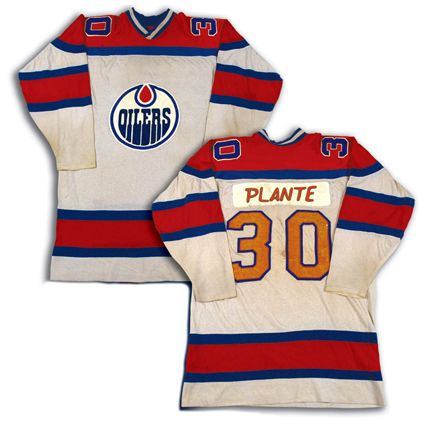
Today's video section begins with an interview with Plante about goalie masks in the 1970's and the modifications made to provide more protection.
Next up is a interview with Plante, Johnny Bower and Glenn Hall from 1977.


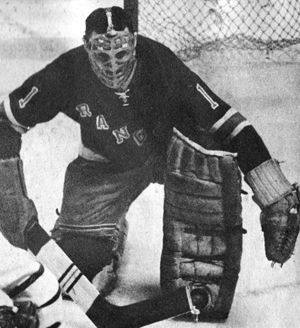
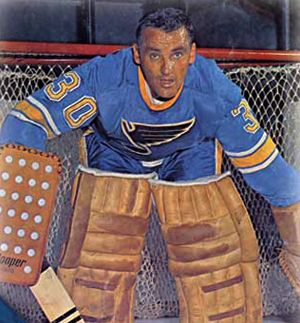
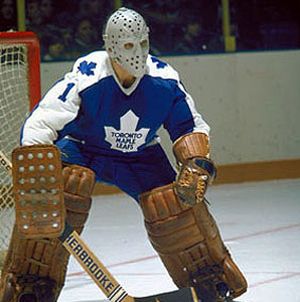
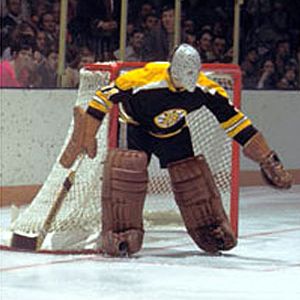
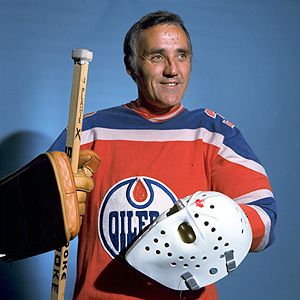
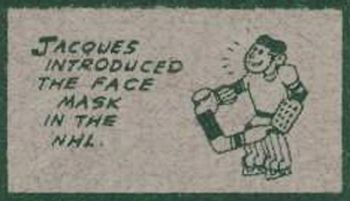
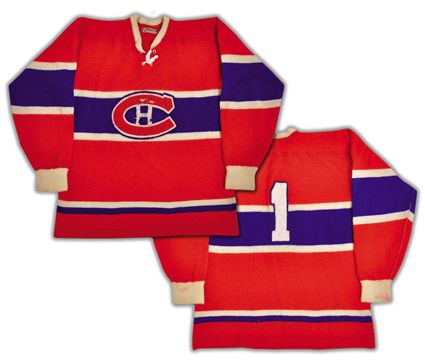










No comments:
Post a Comment
We welcome and encourage genuine comments and corrections from our readers. Please no spam. It will not be approved and never seen.